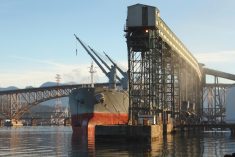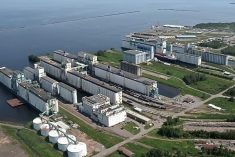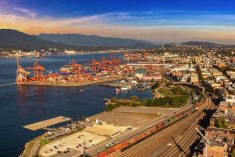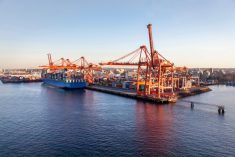CanEst Transit’s grain container terminal at the Port of Montreal is putting $8 million in federal funding toward new equipment and improvements to current infrastructure.
Transport Canada, in a release Wednesday, said the goal of the terminal project is to “increase the number of containers stored onsite, improve the quality of the grain-cleaning service, optimize traffic flow in the yard, and increase capacity for loading and handling containers.”
Set up in 2014 by La coop federee (now Sollio) and other investors, the CanEst facility is sited next to the port’s container terminals to receive grain by rail and truck and provide services such as product cleaning, sifting, packaging and containerizing.
Read Also

Wheat breeding system no longer works, Canadian Wheat Research Coalition report says
A Canadian Wheat Research Coalition report, published Feb. 26, says the status quo is not an option for Canada’s wheat breeding system. It must be transformed, by farmers.
The CanEst terminal, served by both Canadian National and Canadian Pacific railways, has capacity to receive over 100 rail cars and also has with 91 concrete silos, for storage capacity of 68,000 tonnes.
Federal Transport Minister Omar Alghabra and Annie Koutrakis, parliamentary secretary for transport, announced the CanEst funding a week after the final report from the National Supply Chain Task Force was released.
That report, released Oct. 6, the Task Force included a letter to the minister with an “urgent call to address Canada’s transportation supply chain crisis.”
Alghabra said Wednesday the investment for CanEst will help keep supply chains running efficiently.
The task force report goes on to list multiple calls to action, directed mostly at the Canadian government and transportation and supply chain stakeholders.
“Immediately undertake actions to ‘unstick’ the transportation supply chain,” the report’s first recommendation reads.
“These [actions] include addressing congestion at port container terminals and prioritizing government attention on regulations, policies and procedures that are impeding the effective operation of a reliable supply chain.”
Transport Canada said it considers the CanEst project a step toward addressing the issues raised by the task force.
The CanEst project will cost $18 million in total, with the federal component coming from the department’s $2 billion National Trade Corridors Fund (NTCF), which can back both public- and private-sector projects.
CanEst general manager Marc-Aurel Clapperton said the events of the past couple of years have “only deepened our commitment to streamlining the export process.”
Montreal Port Authority CEO Martin Imbleau said the project’s “favourable repercussions” will be “felt even on farms in the Prairies, Ontario and all of Quebec.”
“As Canada’s trade volumes continue to increase, investment in critical infrastructure assets such as seaports, railways, highways and roads, and airports must also increase to meet demand,” the task force said in its report.
Agriculture Minister Marie-Claude Bibeau, in Wednesday’s release, said port infrastructure is “critical” for supporting the flow of Canadian ag products.
— Hannah Polk reports for Glacier FarmMedia from Regina.















